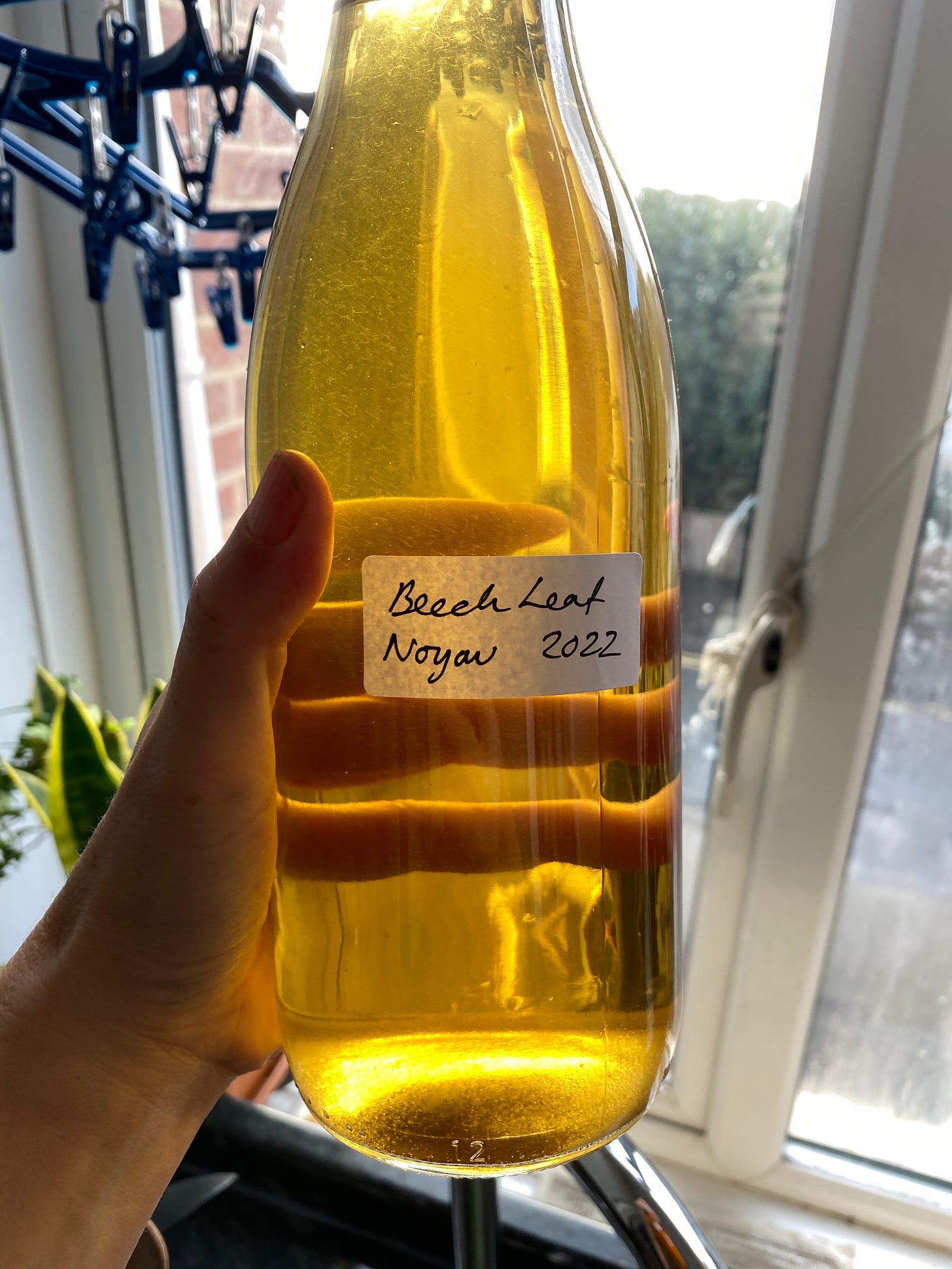The Wondering Guest
Hope as a wild yeast, words as weft, and three years reeling-in a lost dream
I may be sitting in a featureless modern hotel typing these words to you late at night but my mind’s eye is still in the beech leaf green. Today we descended form the Green Mountains of Vermont to the flatter lands of the Hudson in New York State. I missed the mountains as soon as we left them, even shrouded in rain and impenetrable mist. The famous scenic overlooks had zero visibility so instead we ate maple syrup fudge and drank coffee on the refuge of the roads, saving ourselves some pangs in the process. I will return in the autumn, I expect, to learn to make cheese, break bread with loved ones, weave some more of my friends together and allow my hands to make whatever needs to be made.
My ideal holiday or sabbatical is to read books in good company. I have asked some very good friends, with equally good books, if I could be a library mouse in their homes for a short while. So far all have said yes, so over the autumn and winter months you may receive some posts from some far flung couches, even perhaps, a Scotch Sitting Room.
You will also hopefully receive some short films, especially made for Substack subscribers. More on this later in the spring.
Loose Ends
I am accustomed to being away from home, but it is a new and tricky thing travelling so far away when one’s love is 3600 miles and 5 hours east. Conversations between hosts, friends and strangers are woven together, the beloved is included. How do we stay in communion with what and whom are not physically present? How do we do this without drifting away from the present moment, from what is close at hand? Maintaining a thread between myself and family, friends or partner has been an ongoing conundrum over the many years where touring with bands or teaching T’ai Chi took me to Poland, Canada, USA, Scotland, Sweden or elsewhere. Now, older, though perhaps only marginally wiser, I realise the importance of puncturing the mystique of that perfect distance achieved by international travel. It can attenuate connection to a point at which it breaks. I have seen friends and myself swept up in that seemingly inviolable self-contained bubble which can accompany anything other than very low-budget travel. Marriages have faltered. Bands have broken up. What starts as a semi-mystical experience soon becomes an excuse for not bringing ourselves fully back home even as we dump our dusty bags by the front door.
In the recent past I have sat on one end of a string and felt nothing but emptiness greet my hopeful pulls. At other times I have let my own loose end dangle, ignoring the tension in the line, refusing to be in connexion, and yet expecting to be able to pick it up on my return.
But these are not those times, thank goodness. So I will write of host-guesting and then of a shawl the size of an ocean.
The Host and Guest
I have just left a place which has become beautifully familiar. Around me were paintings, drawings, books, cups, quilts, plants, inks, all in lively conversations with each other. If you have not noticed that sometimes windows and rugs are talking to each other, and that daffodils and the woodpile are in agreement with the quartzite veins in the fireside rocks, then it’s time to listen more closely. All great homes, whether tiny boats or vast mead halls, are full of the intimacy of ‘inanimate objects’. Are there any such objects? Perhaps only those that are currently labelled as ‘smart’. Gaston Bachelard’s Poetics of Space first alerted me to a literature of the liveliness and poetry of rooms, cupboards, shells, beyond my physical knowing of them. Now, a Morrisian at heart and in practice, the idea of deliberately dead space or a profusion of impersonal possessions affronts me. I may be sitting at this black desk with my lop-sided old laptop, but I am no aspiring digital nomad, there is an anchor aboard my internal vessel and a good compass too. It always points to my heart’s home, which is currently a small flat by the seaside full of coloured ochres, a dark green dress and a few too many pairs of old but practical boots. But the folk who regularly come through my door are as welcome as Persephone returning in spring: my niece, my flatmate, my dear ones.
This month I am most often a guest but I am always studying to be a better host, for when life allows me to be one again. Guest and host have a common root and are two sides of the same shell, the convex and the concave. One without the other makes neither topological nor social sense. I feel great hospitality has no specific size, only a recognisable shape.1 It can be carried in a pocket as an Opinel knife, ready for cutting and sharing an apple or cheese, or it can be large enough to fill a mansion with well-fed guests at a wedding.
It is not a coincidence that generosity, hospitality and providing for others are central in the practice and mythos of Buddhism, Sikhism, Christianity, as well as other faiths. I currently spend a large amount of time travelling long distances on freeways imagining the food which will be made and shared over the coming year. I cannot read in cars without feeling sick so, beyond handing my friend her opened water bottle, or finding her a snack for the last hour before we stop, I am free to let my mind wander, something rare and welcome in my life. 2
It wanders to this: how to host our souls better. Also, how to make welcome the beloved, the Great Mystery, the more-than-human, the familiar (and the family), the unexpected, the difficult, the cast-out. That last one cannot be tackled alone, and so the desire to congregate with others soon becomes strong again but has not yet found a form. I mitigate it with plans to see people on my return.3 My dreams and hopes sneak back into the wonderings. Yet I thought I had lost them on The Thames, I last saw them well out of reach of my minnow-net and fast heading out to sea. Turns out my endless longing had tied an almost imperceptible thread around them and has been secretly winding them back in towards me, the long way round.
My dreams flowed out three years ago today, past the semi-tidal lock at Richmond, beyond the Mean Time meridian at Greenwich, via Gravesend and out into the North Sea. Then, somehow, those tugs drew them round Margate, Do It Over, Dunk Your Arse, and onwards west towards the Solent. Unbeknownst to me the hope-line (kept spiralling by who knows what part of this creature) pulled them clean as far as Hengistbury Head, despite the longshore drift and its eastward drag. Then three weeks ago I picked a big red rock off the beach and a big handful of sea beet from the clifftop. Only the beet came home to become food, but smuggled with it in my pockets was that strange cargo: dreaming. It weighs almost nothing but changes everything on which it alights, like a wild yeast that makes your sourdough rise unexpectedly well and taste delicious.
When I look back on how meagre my heart-feast-fare had become, how poor my hosting would have been had The Guest arrived, I shiver. Now with bags full of the best blue cheese I have ever eaten (‘Jack’s Blue’ from Parish Hill Creamery) I pinch myself and wonder. How did a secret gyring spin a tiny bobbin, wind an invisible thread, gather in a broken dream and mend it in the brine, then sneak it into my green duffel coat pocket and help me share it in a meal? It seems, like good gut flora, it’s back in my system again. No wonder I had felt empty and unwell periodically. Life can seem heavy and indigestible without some dream leavening it, without people to share it with.
On passing a shuttle back and forth
At first I felt unravelled. Spread too thinly across the Atlantic on arrival, I was not quite myself. Until I recollected the warp: shared friendship, good work, books, myths, food, music, time spent, nature, wildness. So, I set to work sending a shuttle eastwards, past surprised dolphins and sleeping shoals. Now the work is to keep it loaded with bright thread, reflections of the day, the disposition of birches, promises of a peerless joke about two whales walking into a bar, of archaic measurements such as the cubit. In the morning the shuttle returns, in a beautifully contrasting tone, Riddley words, hedgerow colours, cathedral town sounds. It seems a shawl as bright and broad as the Atlantic is taking shape. In two weeks’ time we shall cut it off the loom, full the cloth, and find out just what can be wrapped in it.
This week’s good thing: Beech Leaf Noyau. For you all, (and y’all), and especially for my friend Candace Jensen, as we didn’t get to forage leaves this morning due to rain and time. Here’s a good recipe for this delicious woodland tipple, which you can make right now if your locale is still in early spring and has beech trees in abundance. Pick only side leaves rather than tip leaves from any twig, and spread the picking amongst different boughs and trees. I first made it three decades ago with the recipe from Food For Free. This year I may have missed my chance. Friends, please make some, and let us drink it in October!
Host and guest are a little like U and V in Latin, how we pronounce them differs depending on where we find them, but they are at heart one sense.
Unless we are singing along to ‘classic rock radio’, in which case all discursive thought is impossible.
Including
, , , and other, not-yet-Substacking, people…













Magical drifting thoughts. Love this piece.
Here is one of my favorite phrases you so casually toss out along the way, yet they can open the windows of heart and mind into rooms we have not yet explored, "but smuggled with it in my pockets was that strange cargo: dreaming. It weighs almost nothing but changes everything on which it alights..."
As I read Loose Ends, I could not help but think of Rene Daumal and his little book Mount Analogue.
He said,
"You cannot stay on the summit forever; you have to come down again.... So why bother on the first place? Just this: What is above knows what is below, but what is below does not know what is above. In climbing, take careful note of the difficulties along your way; for as you go up, you can observe them. Coming down, you will no longer see them, but you will know they are there if you have observed them well. There is an art of finding one's direction in the lower regions by the memory of what one saw higher up. When one can no longer see, one can at least know."
So, we live by the memories of what we have come to know in those higher places. Perhaps more than by our present circumstance.